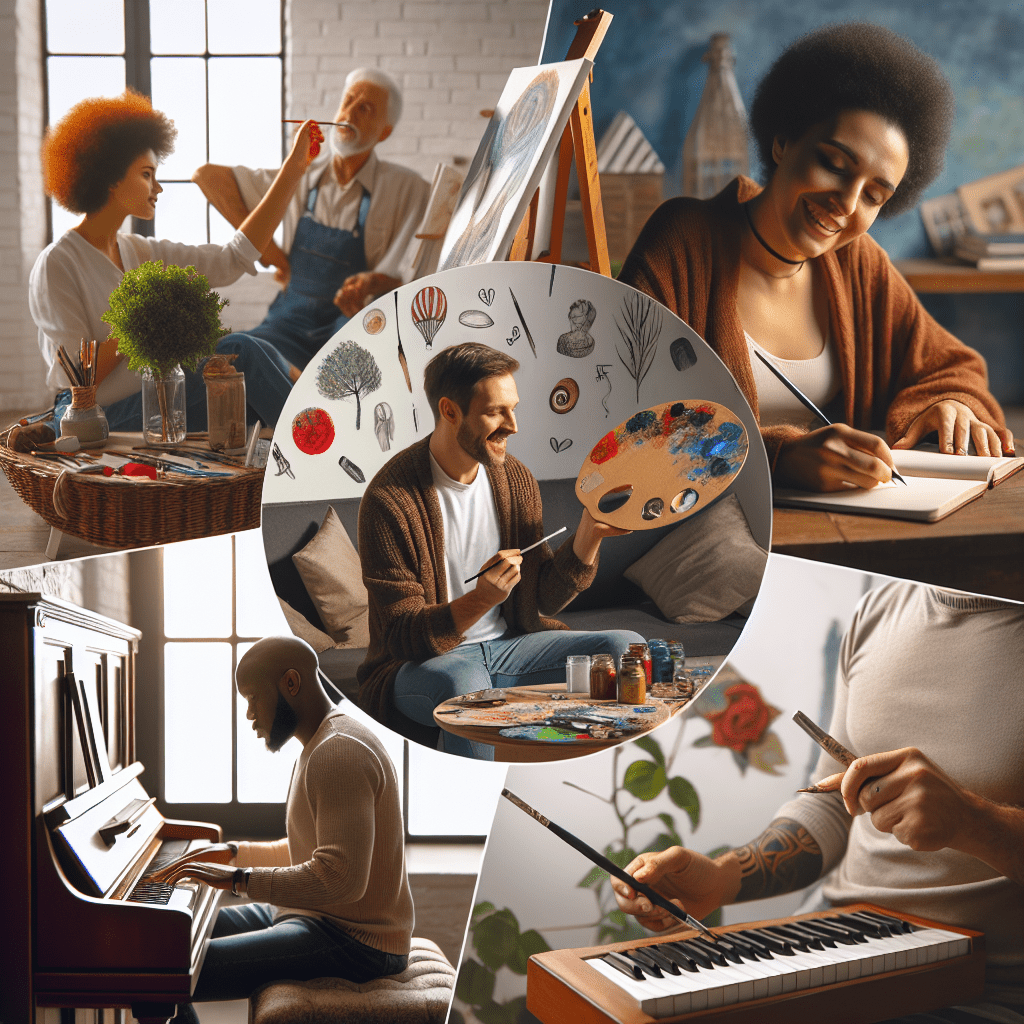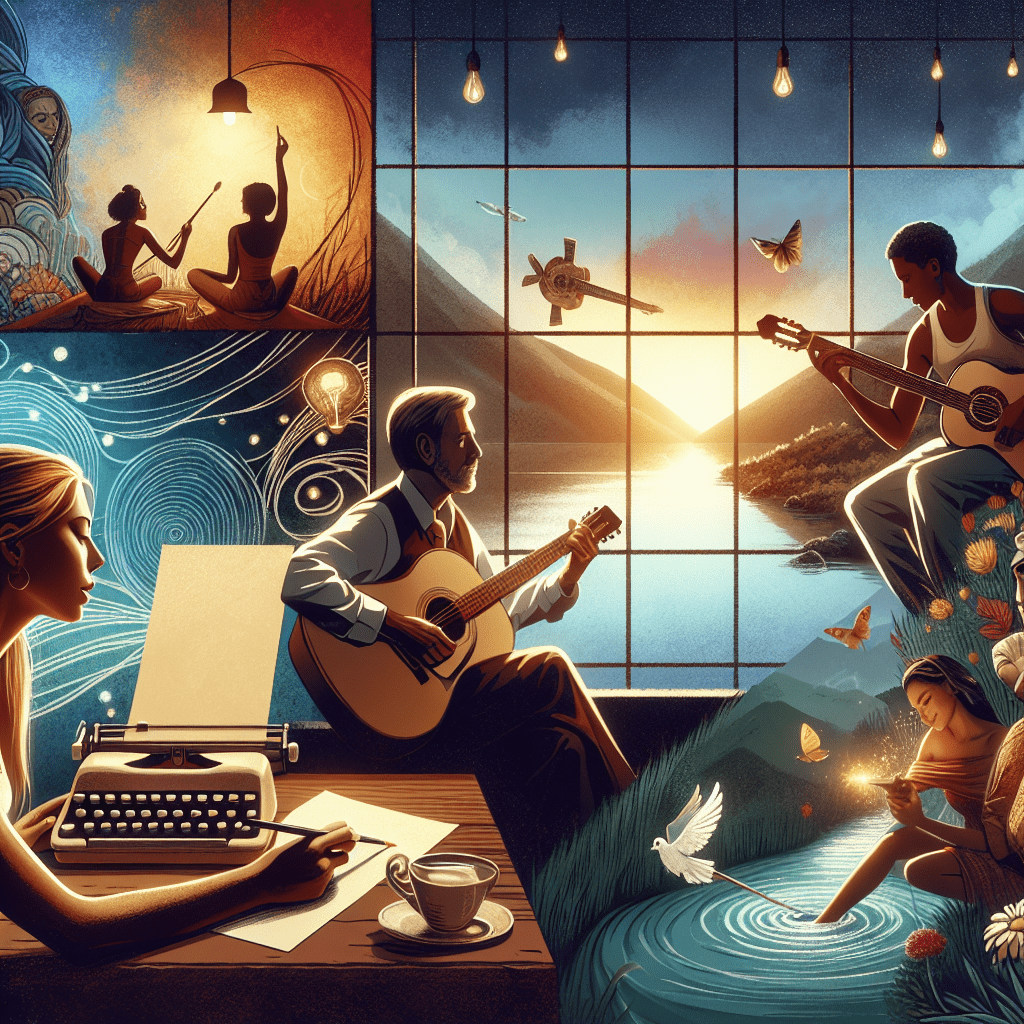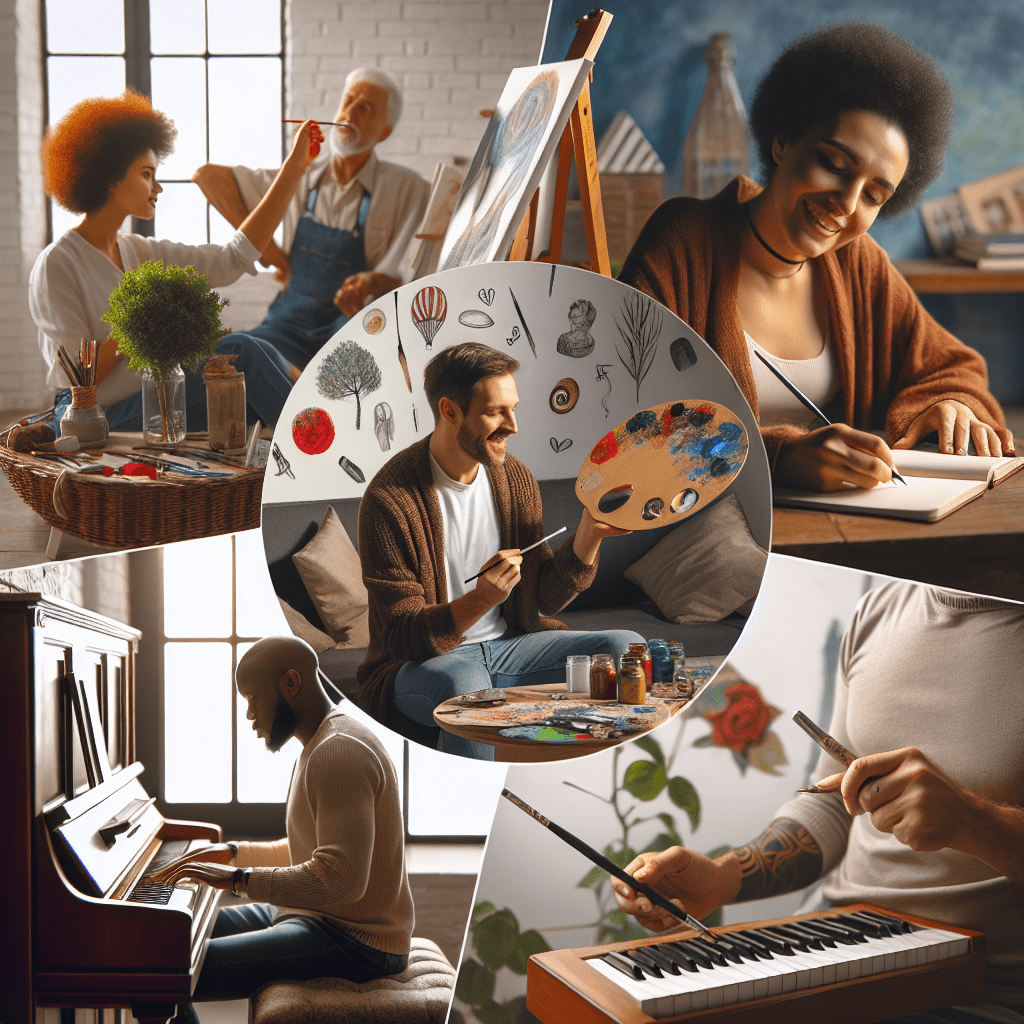Are you looking for ways to improve your mental wellness? Discover the power of creative hobbies! Engaging in activities such as painting, writing, or playing a musical instrument can have a profound impact on your overall well-being. From reducing stress and anxiety to boosting self-esteem and promoting mindfulness, creative hobbies offer a multitude of benefits that can enhance your mental health. So, why not explore your artistic side and immerse yourself in a world of colorful expression and imaginative pursuits? Let your creativity flourish and watch as your mental wellness soars to new heights.

Reducing Stress and Anxiety
Expression of emotions through art
Engaging in creative activities such as painting, drawing, or sculpting can provide an outlet for your emotions. Artistic expression allows you to visually communicate your thoughts and feelings, providing a cathartic release. Whether it’s creating abstract pieces that symbolize your inner turmoil or using vibrant colors to convey happiness and joy, art can help you express emotions that may be difficult to put into words.
Engaging in therapeutic activities
Participating in creative hobbies like pottery, knitting, or gardening can have a calming and therapeutic effect on your mind and body. The repetitive nature of these activities can help distract you from stress and anxiety, allowing you to focus on the task at hand. Engaging in these activities also promotes mindfulness, as you become fully immersed in the present moment, leaving little room for intrusive thoughts.
Relaxation through creative writing
Writing can be a powerful tool for relaxation and stress reduction. Whether it’s journaling, poetry, or storytelling, writing allows you to delve into the depths of your mind and explore your thoughts and emotions. Through the act of writing, you can release pent-up tension, gain valuable insights, and find solace in the written word. The process of getting lost in your own imagination and creating vivid worlds can transport you to a place of calm and tranquility.
Boosting Self-Esteem and Confidence
Exploring artistic abilities
Participating in creative hobbies gives you the opportunity to discover and develop your artistic abilities. Experimenting with various art forms allows you to tap into your creativity and express yourself in unique and meaningful ways. As you witness your skills improving over time, your self-esteem and confidence naturally receive a boost. The recognition and appreciation for your artistic endeavors from others can further enhance your belief in your abilities.
Celebrating personal achievements
Engaging in creative activities provides ample opportunities for personal achievements. Finishing a painting, completing a poem, or creating a beautiful piece of jewelry are all accomplishments that deserve celebration. Recognizing and celebrating these achievements not only boosts your self-esteem but also fosters a sense of pride in yourself and your creative abilities. By acknowledging your achievements, you encourage yourself to continue exploring and growing as an artist.
Sharing creative work with others
Sharing your creative work with others can be a powerful way to build self-esteem and confidence. Whether it’s displaying your artwork in an exhibition, performing your music in front of an audience, or publishing your writing, sharing your creations allows you to receive validation and support from others. Positive feedback and appreciation can strengthen your belief in your artistic talents and provide a sense of recognition for your hard work.
Enhancing Cognitive Skills
Improving problem-solving abilities
Engaging in creative hobbies requires you to think outside the box and find innovative solutions to artistic challenges. Whether it’s figuring out how to arrange the elements of a painting or developing a unique storyline for a short story, creative activities enhance your problem-solving abilities. These skills can then be transferred to other areas of your life, allowing you to approach problems with a fresh perspective and find creative solutions.
Enhancing memory and concentration
Participating in creative hobbies can improve your memory and concentration. Whether you’re memorizing lines for a play, learning a musical instrument, or following a complex knitting pattern, these activities require you to focus and retain information. As you engage in these activities regularly, you’ll notice an improvement in your memory and ability to concentrate for extended periods. These enhanced cognitive skills can have a positive impact on various aspects of your life, from work to personal relationships.
Stimulating critical thinking
Creative hobbies encourage critical thinking as you analyze and evaluate your own work. Whether you’re editing a piece of writing, identifying areas for improvement in a painting, or refining a dance routine, you’re utilizing critical thinking skills. Creative activities also provide opportunities for exploring different perspectives and challenging preconceived notions. By engaging in these activities, you develop a keen eye for detail and a more nuanced understanding of the world around you.

Promoting Mindfulness and Meditation
Focusing on the present moment
Engaging in creative activities requires your full attention, pulling you away from the distractions of everyday life. Whether you’re sketching a landscape or playing music, you enter a state of flow where time seems to disappear, and you become completely engrossed in the task at hand. This immersion in the present moment promotes mindfulness, allowing you to let go of worries about the past or future and fully embrace the here and now.
Creating a meditative state through art
Artistic pursuits can create a meditative state, similar to traditional meditation practices. The rhythmic brushstrokes, the repetitive movements of knitting needles, or the steady beat of a drum can induce a state of relaxation and calmness. Engaging in these activities allows your mind to enter a tranquil and focused state, akin to meditation. The process of creating art becomes a form of mindfulness practice, promoting a sense of well-being and inner peace.
Engaging in mindful activities
Creative hobbies can serve as mindful activities in and of themselves. Whether it’s coloring intricate mandalas, practicing yoga, or engaging in nature photography, these activities invite you to be fully present and engage your senses. The deliberate focus on the task at hand, coupled with a heightened awareness of your surroundings, cultivates mindfulness. Taking the time to engage in these activities regularly can help reduce stress, anxiety, and promote overall emotional well-being.
Fostering Personal Growth and Self-Discovery
Exploring personal interests and passions
Engaging in creative hobbies provides an opportunity for self-discovery and exploration of your personal interests and passions. Through artistic pursuits, you can uncover hidden talents, unearth dormant passions, and discover new aspects of yourself. Whether it’s experimenting with different art techniques or trying out various writing styles, the creative process encourages you to step outside your comfort zone and embrace new possibilities.
Taking risks and embracing new challenges
Creative hobbies offer a safe space to take risks and embrace new challenges. Whether it’s trying a new art medium, exploring a different genre of music, or attempting a difficult dance routine, engaging in creative activities pushes you to step outside your comfort zone. By willingly taking on challenges and embracing the unknown, you develop resilience and a sense of inner strength. These qualities can then be applied to other areas of your life, empowering you to tackle challenges with confidence and adaptability.
Gaining insights and reflecting on experiences
Creative activities provide an opportunity for introspection and reflection. Through the process of creating art or writing, you gain valuable insights into your thoughts, emotions, and experiences. Reflecting on your creative work allows you to gain a deeper understanding of yourself, your values, and your aspirations. This self-reflection can be a catalyst for personal growth and transformation as you uncover new perspectives and make meaningful connections.
Building Resilience and Coping Mechanisms
Using art as a form of therapy
Artistic expression has long been recognized as a form of therapy for individuals facing mental health challenges. Engaging in creative hobbies can serve as a safe outlet for processing emotions, trauma, and stress. Through art, you can channel your feelings into a tangible form, allowing you to externalize and explore your inner world. This therapeutic aspect of creative expression can assist in building resilience and developing healthy coping mechanisms.
Channeling emotions into creative outlets
Creative hobbies provide a constructive way of channeling overwhelming emotions and negative energy. Whether it’s painting, writing, or playing an instrument, these activities allow you to channel your emotions into a creative outlet. Instead of suppressing or ignoring difficult emotions, you can transform them into something beautiful or meaningful. This not only helps in managing immediate stress but also in building resilience and emotional well-being in the long run.
Recovering from trauma through creativity
Engaging in creative activities can aid in the recovery process for individuals who have experienced trauma. Creating art or writing allows survivors to express and process their emotions, providing a means for healing and self-discovery. The act of transforming painful experiences into artistic expressions can be cathartic, helping individuals reclaim their voice and empower themselves. The creative process offers a sense of control and empowerment, contributing to the healing journey.
Improving Communication Skills
Expressing thoughts and feelings through art
Art can be a powerful tool for communication, allowing you to express thoughts and feelings that may be difficult to articulate verbally. Through visual art, such as paintings or sculptures, you can convey complex emotions and ideas in a non-verbal manner. Likewise, performing arts, such as dance or theater, provide an avenue for emotional expression and storytelling. Engaging in these creative activities helps you develop your ability to communicate effectively and authentically.
Engaging in collaborative creative activities
Many creative hobbies provide opportunities for collaboration and teamwork. Working with others on artistic projects, such as theater productions, musical ensembles, or community murals, enhances your communication skills. Collaboration requires effective communication, active listening, and a willingness to share and receive feedback constructively. Engaging in these collaborative creative activities can improve your ability to work with others, while also fostering a sense of connection and shared purpose.
Developing effective storytelling abilities
Creative writing and storytelling activities can enhance your communication skills, particularly in crafting narratives and conveying messages effectively. Through writing stories, poems, or scripts, you learn to engage your audience through compelling narratives and engaging dialogue. These skills can be applied to various aspects of your life, from professional presentations to personal relationships. Developing effective storytelling abilities enables you to connect with others on a deeper level and convey your ideas with clarity and impact.
Providing a Sense of Purpose and Achievement
Setting and accomplishing creative goals
Engaging in creative hobbies allows you to set and accomplish meaningful goals. Whether it’s completing a novel, mastering a musical instrument, or creating a portfolio of artwork, working towards these creative goals provides a sense of purpose and direction. The process of setting goals and working towards them fosters discipline, determination, and perseverance. As you achieve these goals, you experience a sense of fulfillment and accomplishment, further fueling your motivation and sense of purpose.
Transforming passion into a productive activity
Creative hobbies offer a way to transform your passions and interests into productive activities. Instead of merely consuming art, music, or literature, you can actively participate and contribute to the creative sphere. By channeling your passion into creative endeavors, you add value to your life and the lives of others. This sense of productivity and contribution can greatly enhance your sense of purpose, providing a meaningful outlet for your creative energy.
Becoming a part of a creative community
Engaging in creative hobbies often leads to connecting with like-minded individuals and becoming part of a vibrant creative community. Whether it’s joining an art class, attending writing workshops, or participating in community theater, being part of a creative community cultivates a sense of belonging and support. The shared experiences, feedback, and encouragement from fellow creative individuals can inspire you, provide valuable insights, and contribute to your personal growth and sense of achievement.
Creating a Positive Mindset and Emotional Well-being
Boosting mood and happiness through creative expression
Engaging in creative hobbies has been shown to boost mood and promote a sense of happiness. The act of creating something, whether it’s a painting, a song, or a piece of writing, releases endorphins and dopamine, neurotransmitters associated with feelings of pleasure and joy. The process of engaging in creative activities allows you to focus on positive emotions, distractions, and worries. This immersion in the creative process promotes a positive mindset and emotional well-being.
Promoting a sense of fulfillment and satisfaction
Completing a creative project or achieving a creative goal can provide a deep sense of fulfillment and satisfaction. Whether it’s finishing a novel, perfecting a dance routine, or completing a complex mosaic, the sense of accomplishment is unparalleled. Engaging in creative hobbies gives you a tangible representation of your efforts and the progress you’ve made. This sense of fulfillment fuels your motivation, increases self-confidence, and contributes to overall emotional well-being.
Finding solace and comfort in creative outlets
Creative hobbies can serve as a form of solace and comfort during challenging times. When faced with difficulties or emotional turmoil, engaging in creative activities allows you to channel your energy into something positive and constructive. Whether it’s painting as a form of therapy, writing to process emotions, or immersing yourself in music to find solace, these creative outlets provide a sense of comfort and refuge. The process of creation becomes a form of self-care, enabling you to find moments of peace and tranquility amidst the chaos of life.
Managing and Preventing Mental Health Issues
Art therapy for depression and anxiety
Art therapy has been widely recognized as an effective intervention for individuals experiencing depression and anxiety. Engaging in creative activities can provide a non-verbal outlet for processing difficult emotions, reducing stress, and promoting self-expression. The process of creating art allows individuals to explore their inner world, gain insights, and develop coping mechanisms. Art therapy, whether guided by a professional or practiced individually, can be an empowering and healing tool for managing and preventing mental health issues.
Creative writing as an outlet for stress and trauma
Creative writing can serve as a cathartic outlet for individuals dealing with stress and trauma. Through the act of writing, individuals can externalize their thoughts and emotions, gaining a sense of control and understanding. Writing can help process difficult experiences, offering a safe space to explore emotions and find meaning. Whether it’s journaling, poetry, or memoir writing, creative writing provides individuals with a therapeutic tool to cope with stress and trauma.
Using creative hobbies to prevent burnout
Engaging in creative hobbies can serve as a preventive measure against burnout. In a fast-paced world, where demands and responsibilities can become overwhelming, creative activities provide an escape and a source of rejuvenation. Whether it’s painting during downtime, playing a musical instrument, or practicing calligraphy, incorporating creative hobbies into your routine can help you recharge and prevent burnout. These activities enable you to disconnect from work-related stress and find balance in your life, promoting overall mental well-being.
In conclusion, engaging in creative hobbies offers a plethora of benefits for mental wellness. From reducing stress and anxiety to fostering personal growth and self-discovery, creative activities provide a holistic approach to enhancing well-being. By exploring various art forms, expressing emotions, and investing in personal achievements, you can experience the transformative power of creativity in improving your overall mental health. So, why not pick up that paintbrush, write that poem, or experiment with a musical instrument? Embrace the world of creativity and unlock the potential for a happier, healthier, and more fulfilled life.

